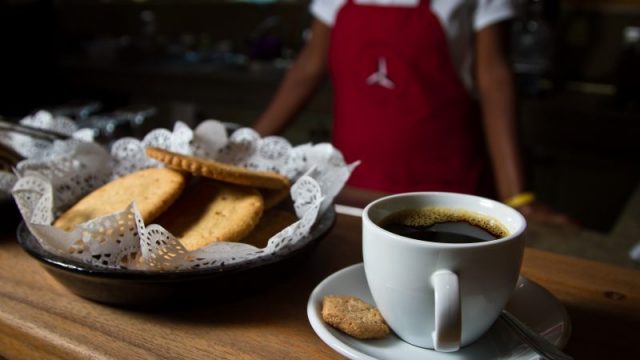“Try this one,” the man in white said as he handed me a glass a quarter filled with a deep red wine poured straight from the barrel. “It’s been aged in oak barrels and is our finest vintage.”
Outside this state-of-the-art winery, yellow and black weaver birds twittered in the trees and gangs of men with catapults ran up and down the alleys between vines like living scarecrows, chasing birds and monkeys off the sun-ripened grapes.
For the past 15 years I have been calling the wine regions of southwest France home, and so I was quite used to pottering about in sunny vineyards. But this particular one was about as far from the hallowed châteaux of Bordeaux as you can imagine. I was in Ethiopia’s southern Rift Valley at the Rift Valley Winery, just outside the small resort town of Ziway.

Vines at Rift Valley Winery (Stuart Butler)
Ethiopia has been producing home-grown wine for years, but it’s generally been of such a poor quality that locals have grown accustomed to drinking it mixed with Coca-Cola. The Rift Valley Winery, which produced its first harvest in 2015, is something a little different though. Owned by French brewery giant, Castel, the Rift Valley Winery has brought the latest wine-producing technology to northeast Africa and the results have so far been encouraging.
In their first year of commercial production the winery produced over a million bottles of reds, whites and rosés and over the next few years they plan to export around 50% of this total to the international market. Currently their biggest international customer is the US, because more traditional wine-drinking nations have shown some resistance to trying Ethiopian wine. However, everywhere the wine has ended up, the reviews have been positive. My guide to the winery explained, “In some cases when people hear we are producing wine in Ethiopia they aren’t interested in trying it, but also it can do the opposite and people want to try Ethiopian wine. It can be good for marketing.”
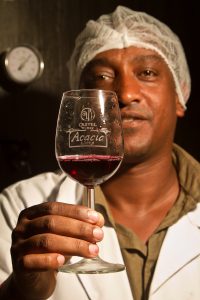
Stuart Butler
But enough of marketing — it was time for lunch, and for this our guide sent us a couple of kilometres back up the road into Ziway and the Kuriftu-Castel Wine House, where a full range of the vineyards’ finest can be enjoyed alongside quality Ethiopian food in relaxed safari lodge-like surroundings.
Kitfo and Injera
Even though wine has yet to find much of a following in Ethiopia, the Ethiopians are food fanatics. Indeed, Ethiopia has one of the world’s great cuisines. It’s varied, spicy, healthy, and utterly unlike anything else you might have eaten before. To find out more, when I returned to Addis I joined one of the new AddisEats food tours.
Genet, our guide on the tour, bubbled with enthusiasm about Ethiopian cuisine and she took great pride in whisking us through four tucked-away, backstreet restaurants and explained the methods that were used to cook each dish and the cultural background to everything we ate. The first stop was in the red-light district of Addis, where Genet steered us into a tiny, gloomy bar that looked as if it had seen one too many late nights and ordered us a selection of spicy wats (essentially the local version of a curry) and the rubbery, slightly sour pancake-like bread of injera, which together make up the staples of Ethiopian food. Although a sour, rubbery bread may not sound too appetising, the flavours were actually everything the setting was not.
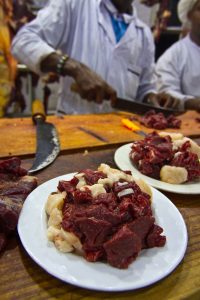
Kitfo (Stuart Butler)
From here we moved to more upmarket surrounds and a big, busy restaurant serving kitfo, which is raw or very slightly cooked red meat, best washed down with a couple of bottles of the local St George beer. Next came the fish course, barbecued and delicious tilapia served at a hidden restaurant a short walk from our meat course. And for dessert Genet said she was taking us to the best juice house in Addis. In a city where thick, fresh juices laced in rich flavours are all the rage this was a big claim indeed, but it was one I could hardly argue with.
No meal in Ethiopia is complete without coffee, and so for our last stop we were taken for a serious caffeine boost in the form of a traditional Ethiopian coffee ceremony. This began with an incense burner loaded with frankincense being lit and fresh grass being scattered on the ground in order to ‘introduce the smell and taste of nature’ to the room. Our host, who sat on a low stall before a tiny charcoal stove, roasted the beans in a pan, pausing frequently to waft the smoke towards us (it’s considered polite to inhale this smoke and express your appreciation of the aroma). She then ground the beans down with a pestle and mortar and brewed up the coffee which was then served, strong and sweet, in tiny dollhouse-sized cups.
Coffee
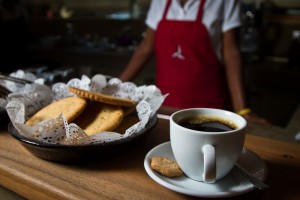
Galani Cafe (Stuart Butler)
My appreciation of Ethiopian coffee continued the next day when I met Heleanna Georgalis, owner of the Galani Café and one of the foremost coffee growers and experts in Ethiopia. As we enjoyed our perfectly manicured macchiatos in her spacious, warehouse-chic café, she told me how Ethiopia was the original home of the bean that has kept the world awake. She then took the time to explain all the intricacies of low-scale, high quality Ethiopian coffee production before inviting me to a tasting room where, in an atmosphere of deadly seriousness, I joined three European coffee merchants buying coffee by the tonne for a coffee tasting (or “cupping,” as those in the trade call it) session. While my nose was clearly nowhere near as refined as those of my fellow cuppers, I found the entire experience fascinating.
It had only taken three days for me to come to conclusion that with its cosmopolitan selection of restaurants, bars and coffee shops and a home grown cuisine unlike anywhere else on Earth, Addis Ababa is one of the top foodie cities in Africa.
Do-It-Yourself Details
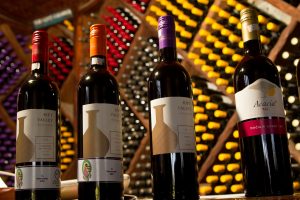
Stuart Butler
The Castel Winery (tel: +251 912609177) offers morning tours on weekdays by appointment only. Tours take about 45 minutes and are free.
The Kuriftu-Castel Wine House in Ziway (about two hours drive south of Addis Ababa) is open daily from 9am to 7pm. Mains cost around 100Birr and wine is available by the glass, or you can buy bottles to take home.
AddisEats (tel: + 251 943076240) runs a variety of food-related tours of Addis as well as market tours and more general tours. The half-day food tour costs US$60 per person and includes all food and drinks. Book in advance.
The Galani Café (Jackros Road, Gerji) is open 8.30am-8pm Thursday to Sunday. As well as great caffeine it serves light meals including a weekend brunch. Coffee ‘cupping’ experiences can be arranged in advance through the café or through the coffee distribution company Moplaco.
The author travelled to Addis Ababa with the well-organised and very professional Abeba Tours (tel: +251 11515530).
Ethiopian Airlines, the national carrier of Ethiopia, flies frequently to Washington DC, Los Angeles, London and other western capitals.
Related content on AFKTravel:
Where To Get Great Ethiopian Coffee In Addis Ababa
Where To Eat Traditional Ethiopian Food In Addis Ababa
10 Things You Didn’t Know About Addis Ababa
